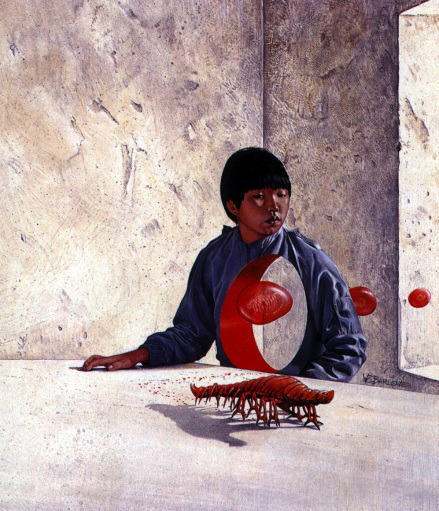I’ve always been fascinated by alien races which parasitize humans.
This never gets old, because it can be written in so many ways—the aliens could be like the souls of Stephenie Meyer’s The Host
What intrigued me about Octavia Butler’s short story "Bloodchild" was the painting it inspired for a cover:
Children, being specifically targeted by the aliens. That was new. So once I found a copy of the collection Bloodchild and Other Stories
The premise is simple. Humans live on another planet in what’s called the Preserve. They coexist uneasily with the natives of that planet, the Tlic, who have multiple limbs, stings and a lower body temperature. They’re intelligent, but they’re wonderfully different from humans.
T’Gatoi whipped her three meters of body off the couch, toward the door and out at full speed. She had bones—ribs, a long spine, a skull, four sets of limb bones per segment. But when she moved that way, twisting, hurling herself into controlled falls, landing running, she seemed not only boneless, but aquatic—something swimming through the air as though it were water. I loved watching her move.
Tlic males mate and die, but the females live to adulthood and lay eggs. Here’s where the humans come in, since the eggs have to be laid in hosts, and the size and strength of the resulting Tlic depends on the kind of host. Having the eggs introduced isn’t difficult, since the Tlic females release a fluid that relaxes the host, but what’s painful, terrifying and potentially deadly is the hatching. The grubs eat anything except the flesh of the Tlic who laid them, so if they’re not removed from the human in time…
This could have been an excellent horror story by itself. What makes it deeper and more intriguing is T’Gatoi’s relationship with Gan—the human narrator—and his family. His older sister, Xuan Hoa, wants to be a host. His mother is torn between her friendship with T’Gatoi and her need to protect her children. And T’Gatoi tries to balance her biology, the demands of other Tlic, and her fondness for Gan’s family.
This is one of those stories that can be read again and again. I loved the dual meaning of “host”, the complex ever-changing interplay between humans and Tlic as groups, and the different attitudes to being parasitized. I liked how Gan grows up in the course of the story. When he refuses T’Gatoi’s eggs and uses a rifle to show how strongly he feels about it, she makes it clear this has to be his choice.
“How could I put my children into the care of one who hates them?”
The utter alienness of the Tlic is beautifully balanced out by this, and the ending is quiet but emotional. I only wish Butler had written more stories set in this world.
Tweet







No comments:
Post a Comment